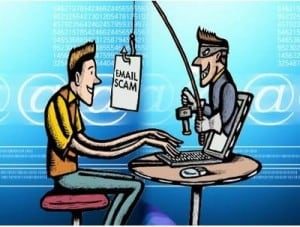 A phishing email attack is accomplished by cybercriminals using a simple email to lure users to log onto a phony website. This is a practice used daily and thousands of emails are sent by professional criminals who hope that its recipient responds by inputting their personal information and replying back or simply clicking a link.
A phishing email attack is accomplished by cybercriminals using a simple email to lure users to log onto a phony website. This is a practice used daily and thousands of emails are sent by professional criminals who hope that its recipient responds by inputting their personal information and replying back or simply clicking a link.
Individuals who initiate phishing emails want you to believe that they are an honest to goodness legitimate company in which you have a business relationship with. Their mission is to obtain your username and password, account information and other various items like a social security number and/or date of birth that ultimately assist them in stealing your funds and identity.It is not too difficult to spot a phony email as these professional criminals tend to use poor spelling and grammar. Legitimate companies such as banks usually have auditors that proofread a large amount of emails that are sent out to their customers to ensure the email lacks spelling errors and poor grammar. If you receive an email such as this, more than likely it is a scam.
Another indicator of a phishing email is those containing link(s). If you receive this type of email do not click on the link as it may redirect you to a phony website asking you to enter personal information. Also notice if an email uses language which sounds threatening. For instance one frequent tactic seen is informing you that if you do not reply, your account or access will be closed.
Yet another popular way criminals obtain personal information is by sending out emails pretending to be from a company that you have a relationship with. Unlike the emails that just use poor grammar and spelling, this email uses graphics which makes it double as hard to tell the difference as to their legitimacy. Often they use the same colors and fonts in the company name so it can be difficult to differentiate their legitimacy. Again these have links inside them that must not be clicked particularly if it was not solicited. Also avoid opening any attachments as they often contain a malicious program that can destroy your computer.
Phishing emails are extremely serious and unfortunately they are on the rise. At first they appear harmless since they “only” ask you to verify your information but remember that our identity must be protected at all costs.
Another indicator of a phishing email is those containing link(s). If you receive this type of email do not click on the link as it may redirect you to a phony website asking you to enter personal information. Also notice if an email uses language which sounds threatening. For instance one frequent tactic seen is informing you that if you do not reply, your account or access will be closed.
Yet another popular way criminals obtain personal information is by sending out emails pretending to be from a company that you have a relationship with. Unlike the emails that just use poor grammar and spelling, this email uses graphics which makes it double as hard to tell the difference as to their legitimacy. Often they use the same colors and fonts in the company name so it can be difficult to differentiate their legitimacy. Again these have links inside them that must not be clicked particularly if it was not solicited. Also avoid opening any attachments as they often contain a malicious program that can destroy your computer.
Phishing emails are extremely serious and unfortunately they are on the rise. At first they appear harmless since they “only” ask you to verify your information but remember that our identity must be protected at all costs.
